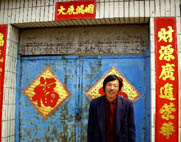| Reviving the Rural Financial Market
By staff reporter LI YAHONG
SONG Deshun, from Huangtuozi Village in Miyun County, Beijing, has just obtained an RMB 8,000 loan from a recently formed agricultural mutual-aid fund — money he will now use to expand his mushroom growing business. Although the scheme is still in its early stages, Song's fellow villagers have already expressed great expectations for this novel "grassroots bank."
Since 2006, the Chinese government has considerably increased its support for the rural financial market, and diversified financial institutions have begun to establish themselves in the countryside. "Thanks to China's economic development, the rural financial market is reviving," says Du Xiaoshan, deputy director of the Rural Development Institute at the Chinese Academy of Social Sciences. However, there is still some way to go before the countryside can match the cities in terms of access to capital.
 |
|
Huangtuozi villager Song Deshun in front of his home. |
A "Grassroots Bank"
In August 2007, the Miyun Edible Fungus Cooperative subsidized the establishment of an agricultural mutual-aid organization in Huangtuozi Village, whose capital fund now benefits 47 local households. Each family is able to obtain an RMB 8,000 loan by buying a share worth RMB 1,000, with a maximum of two shares per household.
Edible fungi have a short planting time and a high return. Nevertheless, many villagers were once handicapped by the intensive raw material input required. The new mutual-aid fund has gone a long way to helping the village's mushroom growers meet their most pressing production costs.
In fact, Song's loan was not disbursed to him in cash, but in mushroom spores worth RMB 8,000, which he has agreed to sell back to the cooperative once harvested for RMB 0.8 per kilo. Although the price is much lower than the market price, Song is satisfied. "What we do is quite labor saving. We just apply water and a shovel, and the cooperative takes care of the rest."
Once the mushroom crop has been sold, any money above the amount of the loan is for the farmer to keep. Yuan Yuzhong, a member of the organization who bought two shares, has made a tidy profit this time around. "I will have RMB 5,000 to 6,000 after selling this batch of mushrooms."
"This system has partially solved the loan problems many farmers have," says Du Xiaoshan. Fourteen years ago, Du established a "poverty-alleviating economic cooperative" in a poverty-stricken village, drawing on the experiences of Nobel Prize winner Muhammad Yunus's "rural bank" model. A Bangladeshi banker and economist, Yunus won the 2006 Nobel Peace Prize for launching the Grameen Bank, which extends micro-credits to Bangladesh's poor. As a result, 2.4 million rural Bangladeshi families have since been able to escape crippling poverty.
| 